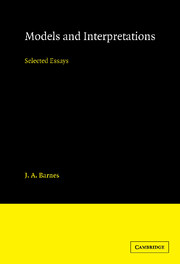Book contents
- Frontmatter
- Contents
- Preface
- Acknowledgments
- Introduction: social science in practice
- I MODELS OF THE REAL SOCIAL WORLD
- 1 Genetrix: genitor:: nature: culture? (1973g)
- 2 African models in the New Guinea highlands (1962a)
- 3 Agnatic taxonomies and stochastic variation (1971n)
- 4 Class and committees in a Norwegian island parish (1954a)
- 5 The righthand and lefthand kingdoms of God: a dilemma of Pietist politics (1971k)
- 6 Indigenous politics and colonial administration, with special reference to Australia (1960a)
- 7 The perception of history in a plural society: a study of an Ngoni group in Northern Rhodesia (1951c)
- II MODELS OF SOCIAL SCIENCE
- III A MODEL OF MODELLING
- Postscript: structural amnesia (1947: 52–3)
- Bibliography
- Index
7 - The perception of history in a plural society: a study of an Ngoni group in Northern Rhodesia (1951c)
Published online by Cambridge University Press: 08 January 2010
- Frontmatter
- Contents
- Preface
- Acknowledgments
- Introduction: social science in practice
- I MODELS OF THE REAL SOCIAL WORLD
- 1 Genetrix: genitor:: nature: culture? (1973g)
- 2 African models in the New Guinea highlands (1962a)
- 3 Agnatic taxonomies and stochastic variation (1971n)
- 4 Class and committees in a Norwegian island parish (1954a)
- 5 The righthand and lefthand kingdoms of God: a dilemma of Pietist politics (1971k)
- 6 Indigenous politics and colonial administration, with special reference to Australia (1960a)
- 7 The perception of history in a plural society: a study of an Ngoni group in Northern Rhodesia (1951c)
- II MODELS OF SOCIAL SCIENCE
- III A MODEL OF MODELLING
- Postscript: structural amnesia (1947: 52–3)
- Bibliography
- Index
Summary
This chapter, like the previous one, deals with a social field marked by heterogeneity, by the imposition of colonial rule over indigenous peoples, but the focus of attention shifts from political control to perceptions of the past and the implications of the introduction of writing. While writing the paper in 1950 I began to think about our concept of history, so beginning a line of discussion carried further some twenty years later in my paper on Levi-Strauss (Chapter 9).
The paper is based on observations made in the field in central Africa between 1946 and 1949. Writing so soon after I had left the field I described what I had seen in the present tense; it would have seemed excessively pedantic to have written about customary practice of such recent date in the past tense. Now, nearly forty years later, the present tense has become inappropriate in the light of the major changes that have occurred during the intervening period. I have therefore changed the tenses as necessary, partly to emphasize that the situation I describe no longer holds, and partly to avoid any suggestion that I am writing in what anthropologists call ‘ the ethnographic present’ tense, a literary device intended to detach tribal societies from their historical context so that they could be studied as museum specimens, uncontaminated by Western influences. This is precisely what I do not want to do. […]
- Type
- Chapter
- Information
- Models and InterpretationsSelected Essays, pp. 120 - 130Publisher: Cambridge University PressPrint publication year: 1990



